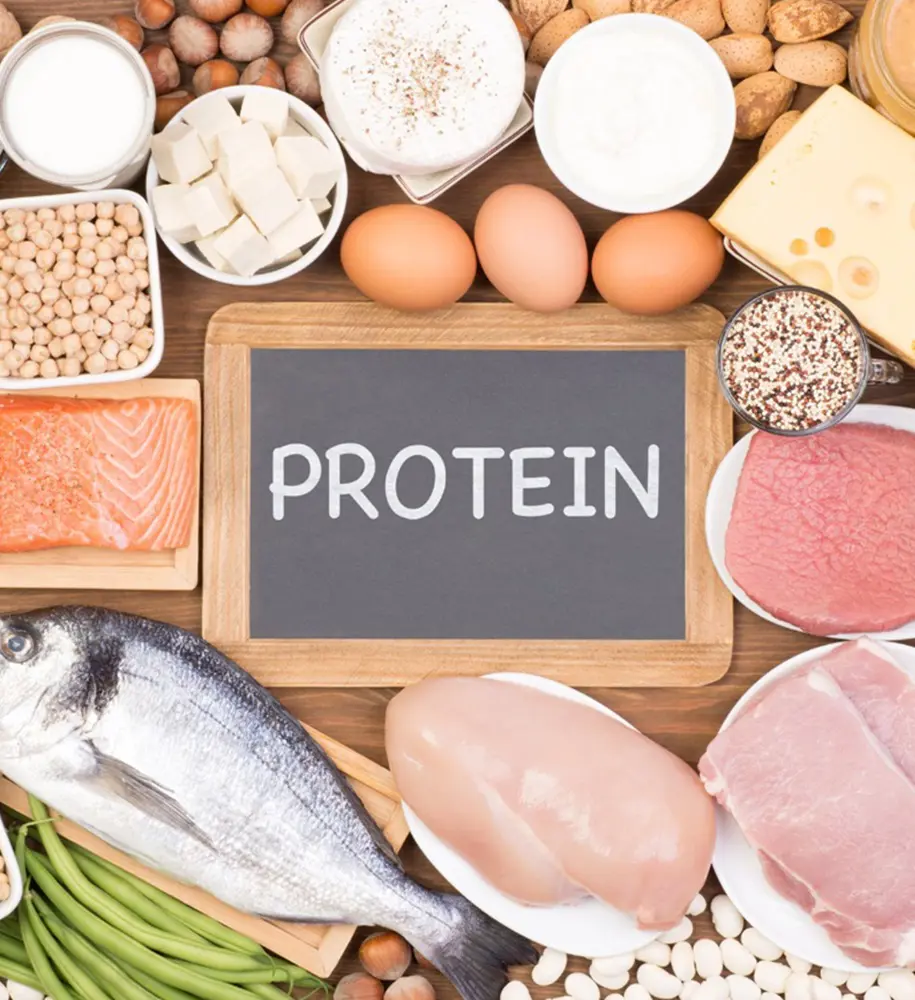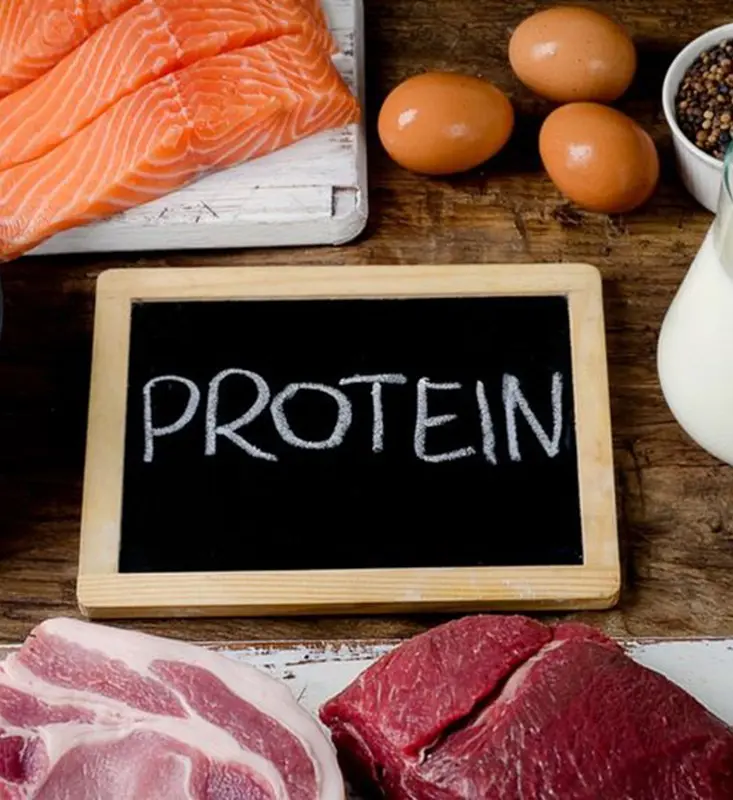How Much Protein Should You Consume In A Day?

This post may contain affiliate links. If you make a purchase through links on our site, we may earn a commission.
Protein is one of the macronutrients that are essential in the human body for tissue building, repair, immunity and hormonal balance. The Recommended Daily Allowance or RDA covers a daily protein allowance of 0.8 grams per kilogram of body weight which denotes a minimum dietary protein to avoid malnutrition.
Nonetheless, the proportions of proteins that one should take vary with factors such as age, gender, activity levels, health goals as well as the diet being followed. In this article, we will discuss the daily recommended protein intakes, the likely outcomes of changing protein portion sizes and how each individual’s protein serving should be determined.
Recommended Daily Intake For Protein

Like other nutrients, there is a recommended daily allowance of protein as proposed by the government.
The National Academy of Medicine has designated 0.8 grams per kilogram of body weight as the daily requirement for the typical grown-up. This is about 56 grams of protein for males and 46 grams for females per day. Yet, people with active lifestyles or certain conditions may need more protein than the average man indicated in the RDA list. Protein intake also differs with age, sex, weight, and level of activity in terms of the portion size recommended per day.
To estimate your individual protein needs, multiply your total body weight in kilograms by the recommended protein range depending on activity level or need. For instance, if you are 68 kg and want a moderate fitness level, you may require between (68 kg x 1.2 – 2.0 g) or 82-136 grams of protein daily.
Needs Of Protein In Different Populations
As discussed earlier, the required daily protein intake differs depending on factors such as age, gender, activity level, and state of health. However, general rules can be helpful to most individuals as a basis for initiating the eating plan.
For Infants, Children and Teenagers

The recommended dietary allowance for protein in infancy is approximately 1.52 g per kilogram of body weight in the first six months, whereas for the infants in the seventh to twelfth months, it is approximately 1.2 g per kilogram of body weight.
The recommended dietary allowance for children in the age range of 1-3 years is 13 grams per day, 4- 8 years is 19 grams per day and 9-13-year-olds is 34 grams per day.
However, there is a slight variation in the RDA depending on the age of the teenagers which ranges between 14-18 years. Teenage boys need 52 g while adolescent girls need 46 g of protein per day.
For Older Adults
With aging, the utilization of protein in the body declines, therefore, one might require more of it to aid in the maintenance of muscularity and power. Adult males and females such as those over 65 years should consider having about 1.0- 1.2 grams per kilogram of body weight. For example, a 70 kg older adult shall need about 70 to 84 grams of protein per day.
For Pregnant And Lactating Women

The RDA shows that pregnant women should gain approximately 1.1g per kilogram of body weight and 1.3g per kilogram in lactating women. Pregnant or breastfeeding women need extra doses of protein for the development of the fetus and the production of breast milk.
For Active People And Sportsmen
Endurance and strength exercise enthusiasts may need more protein because their muscles undergo rigorous activity and require rebuilding each day. The recommended daily intake range is around 1.2 to 2.0 grams per kilogram of body weight based on the level of activity.
Role Of Protein In The Body
Protein is one of the macronutrients, which consists of molecules called amino acids essential in several operations of the body.
Here are some of the roles of protein in the human body:
Muscle Building And Repair

Protein is composed of amino acids that are very vital in muscles and their repair since muscles are made from amino acids. Micro tears happen in muscles when someone is exercising, specifically, when the individual is doing resistance exercise or any other vigorous exercises. Protein intake after such activity proves beneficial as it supplies the required amino acids for muscle repair.
Furthermore, protein intake also creates a surge of anabolic hormones to support muscle building.
Immune Function
Research has discovered that certain amino acids take part in the activation and multiplication of various immune cells. These amino acids play a crucial role in constructing antibodies and cytokines, two regulators that are utilized in immune response to counteract pathogens, as well as in communication between cells.
Furthermore, protein plays a significant role in regulating body inflammation, which, in turn, is an essential part of the immune system mechanism. Studies show that protein intake aids in increasing levels of positive cytokines such as IL-10 that modulate inflammation to avert excessive tissue damage in cases of immune response. Taking its action on immune cells and regulation of the inflammatory mediators into consideration, protein plays an essential role in the operation of the immune system, both in terms of generation and functionality.
Hormone Regulation

Some hormones like insulin, glucagon and growth hormones are all protein-based, meaning their synthesis depends directly on the availability of amino acids provided by protein in foods. Moreover, some amino acids like tryptophan are necessary for the synthesis of neurotransmitters to help manage moods and stress hormones.
Transport And Storage
Protein is also required for moving several things such as nutrients, hormones and other molecules in the body where they are required. Carrier proteins and channel proteins are both transport proteins that help transported substances get through the cell membranes.
Apart from that, proteins also play significant roles in storage. Some proteins ensure that nutrients are stored in a readily available and usable form, in case the body needs them in the future. For instance, ferritin is a storage protein that binds iron and then at some point, releases it into circulation in a controlled way to ensure that there is adequate iron without excessive amounts.
Fluid Balance
Concerning body fluid balance, protein is widely known for its capacity to exert osmotic pressure. Plasma proteins, particularly albumin play a crucial role in this process. They assist in regulating a proper ratio of the fluid contents in blood vessels by drawing in the water into the bloodstream. This osmotic pressure is necessary to ensure that fluid does not extravasate into tissues, which can lead to conditions such as edema.
Besides that, other plasma proteins such as globulins are also implicated in fluid balance and osmoregulation. Proteins aid in regulating the concentration of solutes such as electrolytes in the blood and play a significant role in various cellular processes.
How Much Protein Is "Too Much"?

What constitutes excessive protein consumption may also depend on age, activity level, metabolic rate, and even genetic predisposition. Many nutritionists believe that it is safe for individuals to consume up to 2 grams of protein for every kilogram of their body weight per day. Some investigations even suggest that protein intake can go as high as 3.5 grams per kilogram, especially for those engaging in intensive exercises and strength training with minimal adverse effects witnessed.
However, daily intake beyond these recommendations may impact a person’s body negatively leading to digestive complications, dehydration, tiredness, and potentially long-term damaging impacts including kidney failure and heart disease. Other studies have also noted that diets that contained relatively high levels of protein affected the body’s fluid balance and triggered dehydration because the body required a lot of water to eliminate nitrogen by-products.
Protein Consumption In The United States
The NHANES data show that the average protein intake within the global population differs significantly with age and gender. For instance, adult men and women consume about 98.3 gm and 69.8 gm of sugar per day respectively.
These figures are higher than the RDA of protein which is 56 grams for men and 46 grams for women given a protein requirement of 0.8 grams per kilogram of body weight. The specified intakes are surpassed by most Americans, including young and middle-aged men, who get a large portion of the protein in their diets from animal sources such as meats, poultry, and eggs.
Even though the population in the States consumes quite a satisfactory amount of proteins, some categories of people have a problem meeting their needs, for example, the aged, who intake fewer proteins attributable to loss of appetite or other restrictions.
Effects of Under- And Overconsuming Protein
Protein is a vital nutrient, but its deficiency or excess is not healthy for the body. This makes it necessary to strike a proper balance that you can take in according to the ideal amount that you need. Below are the possible detrimental effects of consuming less or too much protein.
Under-consuming Protein

Insufficient protein intake leads to several health problems because protein is essential in growth, muscle repair, immune function and overall bodily functions.
- Muscle Loss And Weakness: Protein energy deficiency can cause the depletion of muscles, and this is often associated with inactive individuals or aged persons. The body begins to utilize muscle mass in search of amino acids which can result in reduced strength, energy and slow recovery from physical activity. This also leads to higher chances of developing some form of disability and also affects one’s ability to move around.
- Lack Of Growth In Children: Protein is considered vital for the growth and development of kids and adolescents; inadequate supply leads to stunted growth or developmental arrest.
- Edema: Protein deficiency especially where albumin levels in the blood are decreased, results in edema whereby legs, feet and abdomen swell.
- Problems With Hair, Skin And Nails: There are many possibilities of misfortune that people with poor hair, skin, or nails may face if he or she takes insufficient protein in the food they consume. For example, protein deficiency causes hair to become thin and nails to become brittle or develop skin diseases.
Overconsuming Protein

It is essential to have enough protein, but excess is as injurious as deficiency, especially when the daily intake is higher than the body requirement. Excessive protein consumption can lead to various health concerns:
- Dehydration: A diet high in proteins will elevate the urea level, and if you fail to drink water in adequate amounts, the waste product will accumulate in your system. This can be especially challenging for users who exercise frequently because hydration can significantly affect exercise efficiency and muscle recuperation.
- Digestive Issues: Overconsumption of proteins also causes gastrointestinal problems like constipation (if an adequate amount of fiber is not consumed) or loose motion (if proteins are derived from dairy or processed meats). High protein and low fiber diets harm digestion and the overall health of the gut.
- Kidney Disease: In the long run, high protein can lead to the destruction of the kidneys, especially for people with poor kidney health. However, for a healthy person, this risk is significantly lower yet still, it remains a factor to be taken into account.
- Certain Chronic Diseases: High intake of animal-based protein, especially from processed meats such as bacon, sausages and deli meats has been greatly associated with increased cancer risks, especially colon cancer.
- Weight Gain: While protein is beneficial in managing body weight as it makes one feel full, high protein has negative effects when it comes to body weight as it promotes weight gain. If the proteins are suddenly consumed in surplus of the requirement, the extra protein turns into fat and gets deposited in the body if the calories are also high.
How Can You Balance Protein Intake

Protein should be taken in moderate amounts to support body functions, muscles, and metabolism. Here’s a detailed guide on how to achieve a balanced protein intake:
Determine Your Protein Needs
Awareness of your protein needs is the crucial step toward controlling protein consumption. Requirements for proteins also vary with age. For instance, children and teenagers need more protein for growth, while the elderly may need more to address muscle wasting. Similarly, it may be understood that athletes or other physically active people may need even more protein than lean, sedentary individuals.
Distribute Protein Intake Throughout the Day
The utilization of protein can also be described as ideal when it is spread out over the day and not eaten all at once during one meal. This approach can enhance muscle protein synthesis and improve satiety:
- Target about 20- 30 grams of protein per meal to fully replenish muscles and stimulate tissue formation.
- Replenish protein in between meals if necessary, for example, Greek yogurt, nuts or hummus with vegetables.
Recent posts
Lifestyle
Lifestyle
How to Get Rid of Neck Pain: 10 Home Remedies To Fix Stiff Neck
Neck pain is a common issue of today, affecting more than one-third population of the US. The common causes that often lead to stiff neck include sleeping in an awkward position that involves straining of the neck, sitting in a bad posture for long p...
Lifestyle
10 Home Remedies For Loose Motion and Diarrhea
When in tough times, due to issues like loose motion or diarrhea, it would be reassuring for you to know that there are remedies, that also in your own pantry! Whatever the cause may be, be it an infection, food intolerance, or stress, these ingredie...
Lifestyle
How To Eat A Star Fruit
Star fruit is a tropical fruit known for its unique star-like appearance. The fruit can be enjoyed simply, on its own or by adding it on recipes where its extra burst of color and sweet-tart taste can blend well with other ingredients. Whichever way ...
Lifestyle
Is Yogurt Good For You?
Yogurt is a dairy product, a nutrient-packed food. It is often hailed as a health food and there are good reasons for this. If we look into the nutrients present in yogurt; it has numerous of them essential for functioning of our body. In this articl...
Lifestyle
Is Vegan Diet Actually Healthy?
A vegan diet is considered healthy but not most of the time. As all vegan foods have many beneficial nutrients, they also lack some which often sparks the debate. Without animal products, a vegan diet can be believed to have significant health benefi...
Lifestyle
How To Eat Crawfish The Right Way
A crawfish is a small crustacean that resembles a tiny lobster. Though small in size, this freshwater creature is equally delicious as any other seafood, they are tender, sweet and a little salty. Enjoying crawfish may seem challenging as they are ti...





